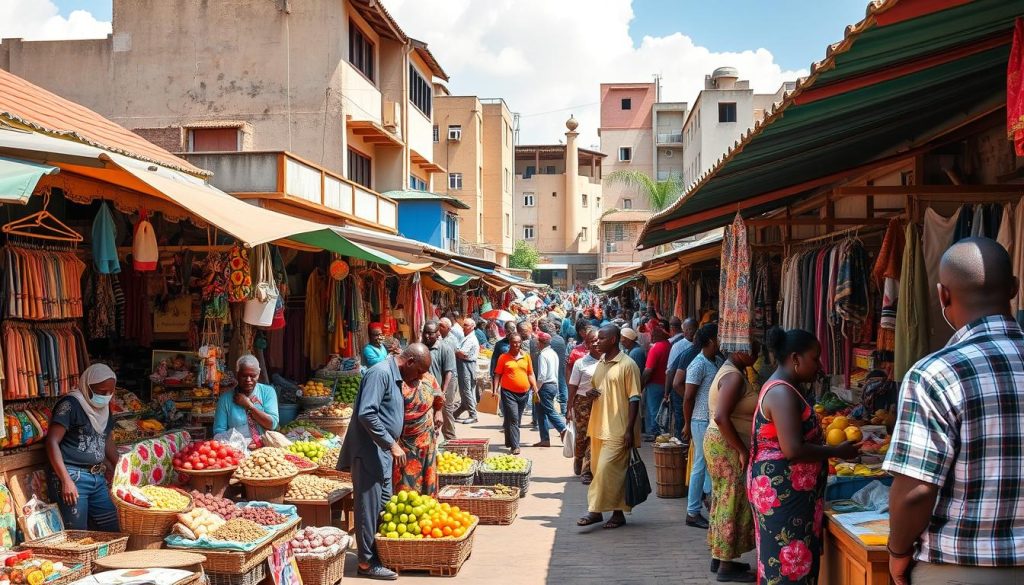Africa is a vibrant place full of business opportunities for English speakers. It has a young population and improving infrastructure. This makes it attractive to entrepreneurs from around the world.
With many economies growing, knowing the local markets is key. The African Development Bank’s research shows that some areas are seeing big market growth. This is great news for new and sustainable businesses.
There are many investment opportunities in Africa. This article will look at these in detail. You’ll find new ideas and success stories that show Africa’s growing entrepreneurial spirit.
Understanding the African Market Landscape
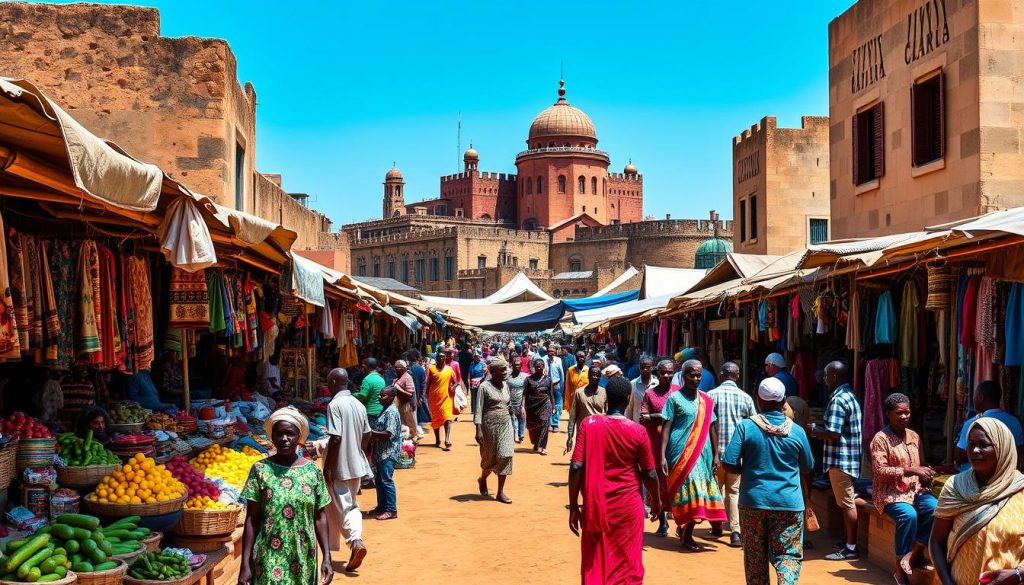
The African market is complex but full of opportunities. It has 54 countries, each with its own culture, language, and economy. Knowing these differences is key for businesses looking to succeed in Africa.
Local customs and rules play a big role in getting into the market. Companies need to learn about these to make the most of their efforts. Speaking the local language helps in building trust and makes doing business easier.
Experts like the World Bank and McKinsey & Company share valuable insights. They say businesses must tailor their approach to fit local tastes and habits. With the right knowledge, the African market can be a great place for growth.
Emerging Sectors for Investment Opportunities

Africa is full of chances for investment in different areas. Technology and renewable energy are key for growth. The tech scene is thriving, thanks to solutions for local problems. This boosts the digital economy in Africa and draws in foreign money.
Technology and Innovation
There’s a buzz around tech start-ups in Africa, especially in cities like Nairobi, Lagos, and Johannesburg. These places are getting a lot of investment. This leads to new platforms for both local and global markets.
Companies like Flutterwave and Jumia are changing the game. They’re making payments easier and improving e-commerce. This focus on innovation makes Africa a great place for entrepreneurs and investors. It helps grow the digital economy and tackles big social problems.
Renewable Energy
Renewable energy is vital for solving energy shortages and climate change. Projects like the Lake Turkana Wind Power in Kenya are making sustainable energy possible. Solar power in Africa is also growing fast, helping local economies and attracting investments.
Government policies are supporting renewable energy. This makes the sector more sustainable and promising for growth.
Business Ideas in Africa for English Speakers

The start-up scene in Africa is buzzing with opportunities, especially in big cities. Places like Cape Town, Accra, and Addis Ababa are key for new businesses. They have strong start-up communities and offer support for many industries.
Business incubators in Africa are crucial for new companies. They provide the tools, advice, and connections needed to grow. This section will look at the thriving start-up world in these cities and share stories of African entrepreneurs’ success.
Start-up Ecosystem in Major Cities
In Africa, the start-up world is growing fast, thanks to more business incubators and accelerators. Big cities are now places where entrepreneurs can turn their ideas into reality. These ecosystems offer:
- Access to funding and investment opportunities.
- Supportive government policies fostering entrepreneurship.
- A collaborative environment with fellow start-ups and mentors.
- Technological infrastructure conducive to innovation.
- Networking events that connect entrepreneurs with potential investors.
Success Stories from Entrepreneurs
Stories of successful entrepreneurs show the potential of Africa’s start-up scene. For example, Iyinoluwa Aboyeji, co-founder of Andela, has made a big impact by creating jobs through tech education. Rebecca Enonchong, CEO of AppsTech, has shown African innovation can shine globally. These stories highlight the creativity and resilience needed for success in Africa.
Key Challenges Facing New Businesses
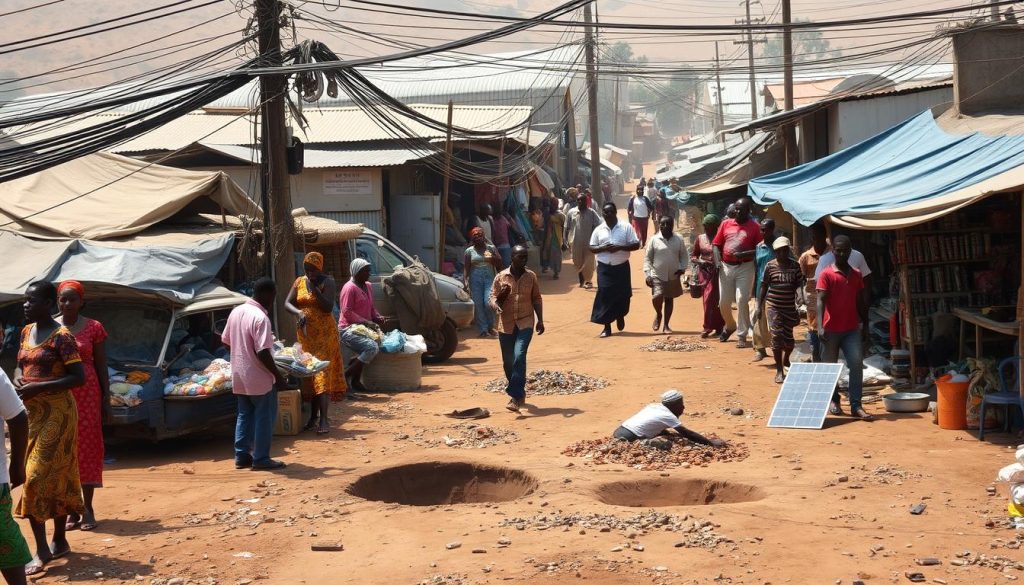
Starting a new business in Africa comes with big challenges. Entrepreneurs face hurdles like red tape, poor infrastructure, and different rules in each country. It’s key to know these challenges to succeed.
- Bureaucratic obstacles: Many countries have complex rules that slow down starting a business.
- Infrastructure deficiencies: Limited transport and energy can hinder business operations.
- Diverse regulations: Each country has its own rules, making it hard to follow them all.
- Access to finance: Getting loans is tough, with many facing trust issues with banks.
Getting money is hard because of a lack of credit history and trust in lending. The African Union points out these challenges as major hurdles for businesses. Working together to solve these problems is crucial for supporting new businesses.
Exploring E-commerce Opportunities
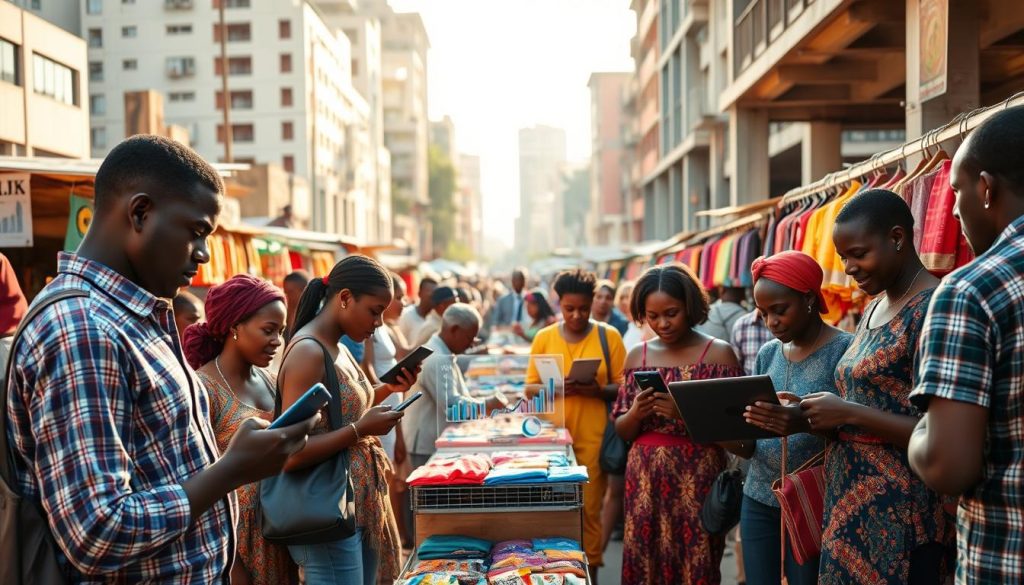
The growth of e-commerce in Africa has caught a lot of attention lately. This is mainly because of the rise in online shopping. Sites like Jumia and Konga have changed how people shop, especially the younger crowd who love online deals.
This change shows a big shift in how people buy things across the continent.
The Rise of Online Shopping
Online shopping is getting more popular, thanks to smartphones and better internet. More people are shopping online, opening up new chances for digital stores. Good marketing and easy-to-use websites help keep customers coming back.
This lets businesses grow in a big market.
Logistics and Supply Chain Management
But, there are big problems for online shops in Africa. Bad roads and unreliable delivery make things hard. Fixing these issues is key for e-commerce to grow.
Working with local delivery services could help a lot. It’s a smart way to improve delivery and make supply chains better. By focusing on logistics, businesses can serve their customers better and run smoother.
The Role of Mobile Banking in Business Growth

Mobile banking has become key for financial services in Africa. It has changed how businesses work and connect with customers. M-Pesa and others have helped entrepreneurs get funds and manage their businesses better than before.
Financial Inclusion
Thanks to mobile banking, more people and small businesses can access financial services. This has boosted entrepreneurship and helped businesses grow. Mobile banking helps businesses understand money better and manage it well.
Mobile Payment Solutions
Mobile payments have changed how we do business and trade. They make it easier for small businesses to deal with customers. New payment systems mean faster, safer transactions for business owners.
Small and Medium-sized Enterprises (SMEs)
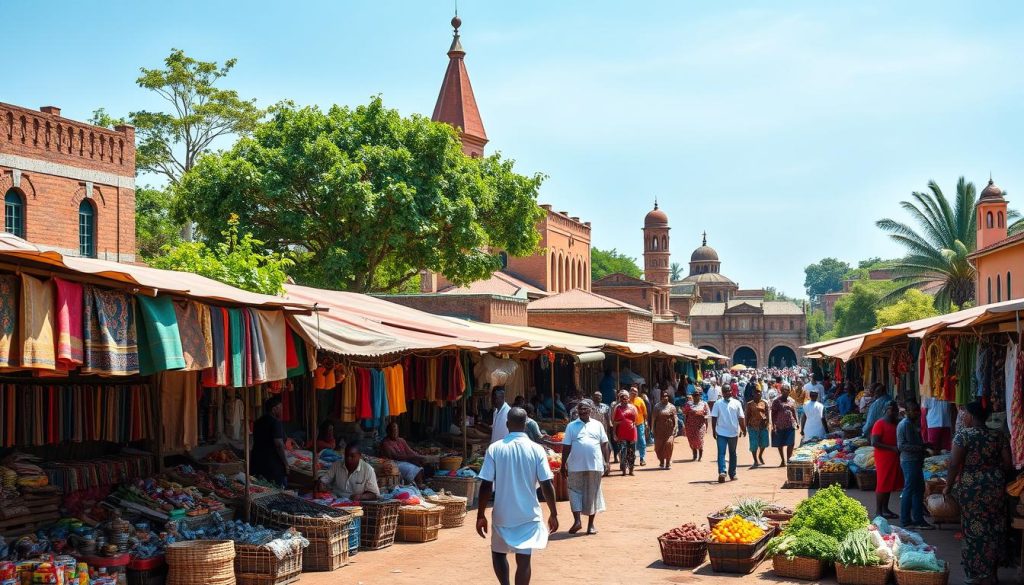
Small and medium-sized enterprises (SMEs) are key to Africa’s economy. They create jobs and boost GDP, helping entrepreneurship grow. But, SMEs in Africa face many challenges that slow their growth.
These challenges include getting finance, lacking infrastructure, and dealing with rules. Many entrepreneurs find it hard to get the money they need to grow. Governments can help by offering funding and resources.
- Access to mentorship and training programmes enhances skills
- Government policies are increasingly geared towards supporting SMEs
- Networking opportunities encourage collaboration and innovation
There are many opportunities for small businesses in Africa, especially in tech and services. By using local knowledge, SMEs can create products that serve their communities. Supporting SMEs not only helps businesses but also strengthens the economy across the continent.
Agri-Business: An Underutilised Goldmine
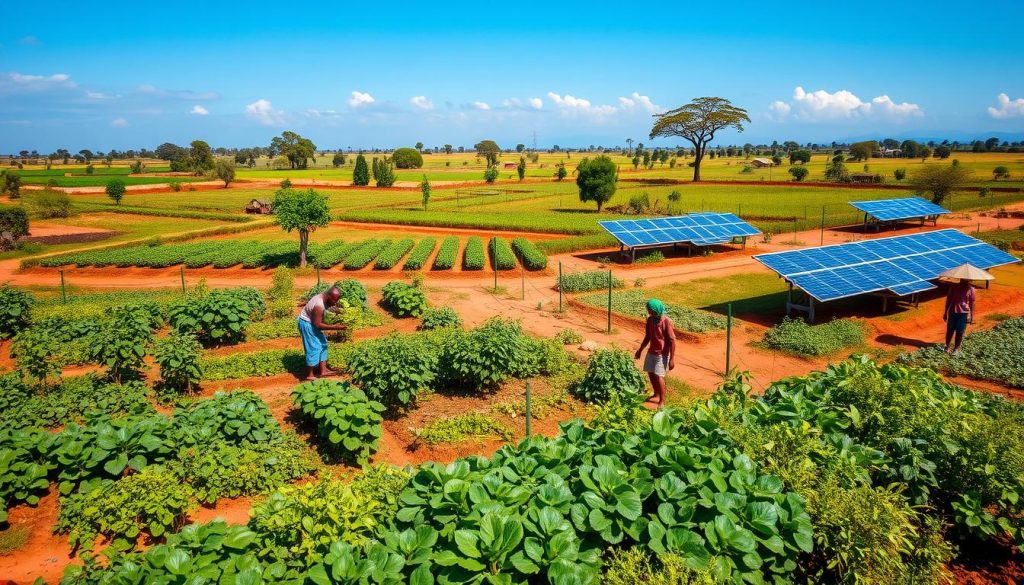
The agricultural sector in Africa is full of potential, but often ignored by investors and entrepreneurs. There are many opportunities for exporting products to markets in Europe and Asia. With the increasing demand for quality goods like cocoa and coffee, starting an export business in Africa could be very rewarding.
Export Potential for Agricultural Products
Africa is home to a wide range of agricultural products. These can be exported to the world, capturing new markets. Key items for export include:
- Cocoa from West Africa
- Coffee from Ethiopia and Kenya
- Fruits and vegetables from South Africa
Successful exporters focus on quality. They make sure their products meet international standards. This focus on quality boosts their reputation and makes them more competitive in the market.
Innovation in Farming Techniques
New farming solutions are changing the way farming is done in Africa. These solutions use technology to improve farming while being kind to the environment. Some notable innovations include:
- Drones for monitoring crop health
- Soil sensors for optimal irrigation
- Mobile apps for market access and advice
Using these new technologies can lead to better yields and more efficient farming. This supports local economies and increases the potential for exporting. Sustainable farming also meets the growing demand for ethically sourced food, helping to ensure food security in Africa.
Tourism and Hospitality Ventures

The tourism and hospitality industry in Africa is growing fast. This growth is mainly in ecotourism and cultural experiences. It offers chances for entrepreneurs and local communities to benefit.
As people look for more responsible travel, Africa’s focus on ecotourism is growing. This shows a lot of potential for the travel business in Africa.
Ecotourism and Sustainable Travel
Countries like Botswana and Kenya are leading in eco-friendly tourism. They show that ecotourism can help the environment and support local people. Eco-lodges and tours run by communities are great examples.
These projects help protect nature while bringing in money for locals. They show how tourism can be good for the planet and people.
Cultural and Heritage Experiences
Cultural tourism in Africa is attracting more visitors. Places like Ghana and South Africa are showcasing their traditions and history. This makes travel more meaningful and enriching.
By sharing stories and offering immersive experiences, these countries are boosting their economies. They are also encouraging more diverse travel businesses to grow.
Franchise Opportunities in Africa
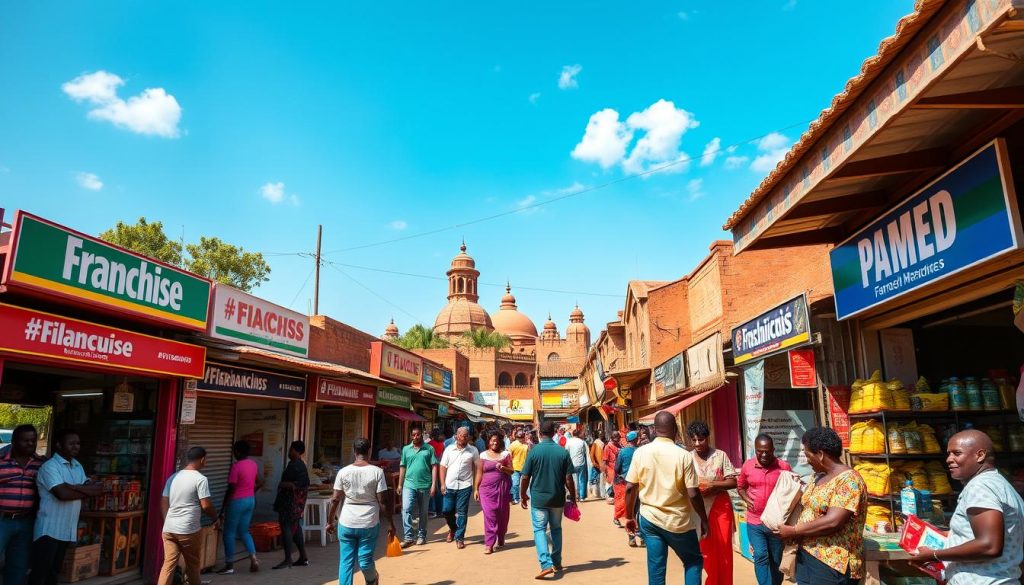
The franchise business in Africa is growing fast. It’s becoming a good choice for both local and foreign investors. This model uses well-known brands and systems, making it safer for new business owners. With Africa’s economies getting stronger, there are many chances to start a franchise in areas like fast food, retail, and education.
Fast food giants like KFC are doing well in Africa. Retail franchises are also growing, attracting more customers who want international brands. The education sector is another area with great opportunities, offering quality training and services.
- Fast Food Franchises
- Retail Brands
- Education Providers
Investing in franchises helps both entrepreneurs and local economies. Franchises create jobs and help people learn new skills. This boosts the economy in Africa. For those thinking about starting a franchise, choosing a well-known brand can really help them succeed.
Education and Skill Development Ventures
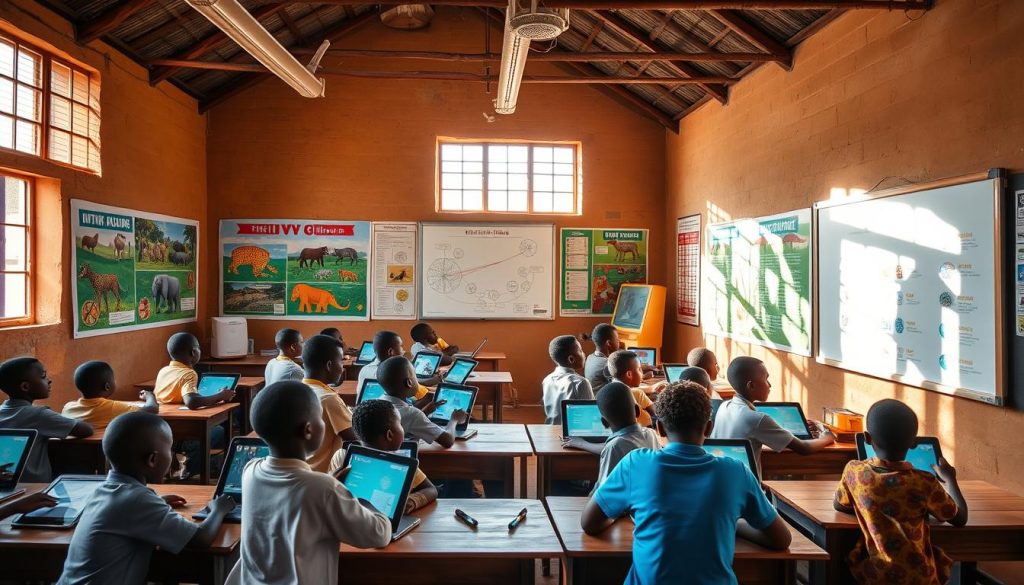
The demand for good education and skill development in Africa is rising. This is because the job market keeps changing. Education technology in Africa is key to making learning better and more accessible. Online learning platforms like Coursera and local efforts are helping more people get educated.
Online Learning Platforms
Online learning platforms offer many chances for businesses to grow skills. They have courses for different industries, helping to fill skill gaps. The reasons people like online learning include:
- It’s flexible, so you can learn at your own pace while working.
- There’s a wide range of courses, from technical to soft skills, helping you advance in your career.
- It’s cheaper than going to school the traditional way.
More money is being put into education technology in Africa. This shows a big commitment to improving learning. By focusing on skills that are useful for jobs, these efforts help both individuals and the economy.
Health and Wellness Industry Prospects
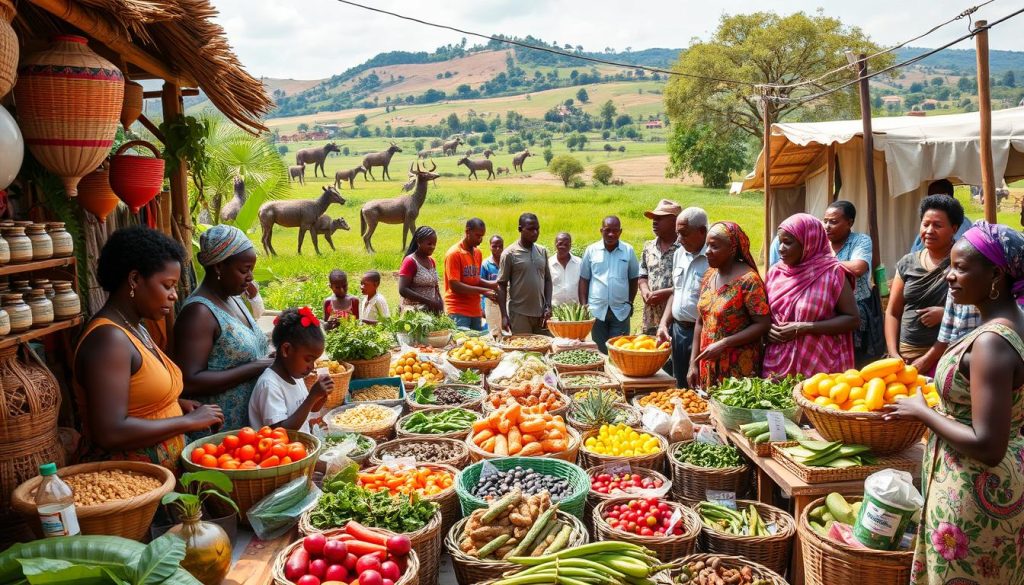
The health industry in Africa is growing fast. More people are becoming aware of health and wellness. This growth offers many chances for investment in wellness businesses.
According to the World Health Organization, there’s a big demand for healthcare, fitness, and wellness products. This is true all over the continent.
There are many areas in the health and wellness industry that look promising:
- Healthcare services, like hospitals and clinics, are needed for the growing population.
- Fitness and wellness centres are becoming popular in cities, focusing on physical health.
- Health-focused consumer products, such as organic foods and dietary supplements, are also in demand.
Investing in healthcare in Africa is not just a trend; it’s a must. It’s needed to meet the changing needs of the diverse population. Investors, both local and international, are stepping up. They’re bringing new solutions and partnerships to improve healthcare access.
The future of this sector is looking good. It’s a key area for those wanting to invest and grow their businesses.
Networking and Building Partnerships

Networking is key for entrepreneurs and investors in Africa. It helps them succeed in the continent’s diverse and changing world. By making strong connections, they can find new partnership opportunities. This also helps them share ideas and get more visibility in the market.
Key platforms help with this networking:
- African Economic Forum – A top place for talks and idea sharing among important people.
- Regional Business Councils – They help by linking local and global businesses in Africa.
- Industry-Specific Conferences – These events are great for networking in specific fields.
Using these platforms, businesses can better understand the complex market. They can also manage risks and find potential partners. Networking is vital for building alliances that help businesses grow and succeed.
Government Policies Supporting Foreign Investment

Government support policies are key to boosting foreign investment in Africa. Governments across the continent use various strategies to attract investors. These include setting up special economic zones, offering tax breaks, and protecting investors’ rights.
Special economic zones offer businesses better conditions. They have lower taxes and fewer rules, drawing in foreign investors. This approach is seen worldwide, as shown by the United Nations Conference on Trade and Development (UNCTAD).
Investor incentives in Africa also include easier permit and license processes. This makes starting a business quicker and simpler. Governments also give out grants or low-interest loans to support certain industries. These efforts have led to more foreign businesses coming to Africa.
Strategies for Successful Market Entry
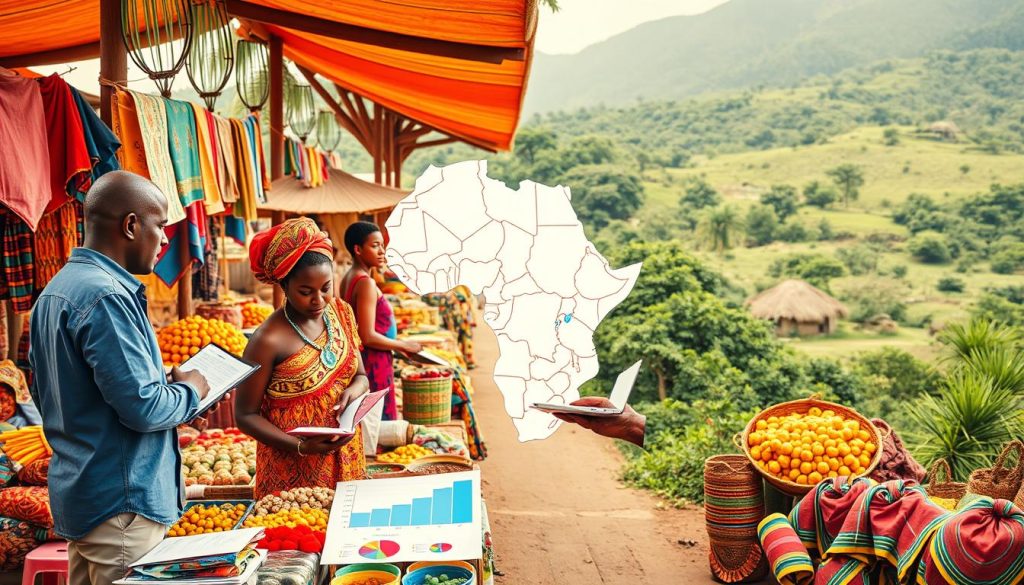
To succeed in Africa’s fast-changing market, it’s vital to have clear entry strategies. Knowing what consumers want and the market conditions is key. Doing thorough market research helps spot opportunities and gaps in different sectors.
Conducting Market Research
Market analysis gives important insights for making decisions. It’s important to look into:
- What customers like and what’s trending
- How to stand out from competitors
- Demographic and regional differences
- Economic and regulatory factors
Using reliable data makes market research in Africa more effective. This helps companies tailor their products to local tastes and needs.
Establishing Local Partnerships
Working with local partners can greatly help foreign companies in Africa. They gain:
- Access to good distribution networks
- Deeper understanding of the local market
- Shared skills and resources
- Better brand reputation and recognition
Big brands like Coca-Cola and Unilever have done well in Africa by teaming up with local businesses. This shows how powerful partnerships can be for success. By working with local firms, companies can be more flexible and responsive, strengthening their position in the market.
Future Trends in Business in Africa
The future of business in Africa is changing fast. Digital transformation is making businesses more efficient and reaching more people. The internet and mobile phones are helping companies use e-commerce and digital marketing.
This change is not just for now. It shows Africa’s market is growing in the digital world. This growth could lead to lasting success in the digital economy.
Sustainability is also becoming key for businesses in Africa. Companies are focusing on being eco-friendly and socially responsible. This is because more people care about the environment.
Businesses that focus on the environment are likely to do well. This is because consumers are looking for companies that care. Green technologies and renewable energy are creating new opportunities for businesses.
Demographic changes like urbanisation and a young population are also important. A growing middle class means more people can buy things. Companies that understand these changes will do well.
Knowing about these changes helps businesses plan for the future. It ensures they can succeed in Africa’s diverse market.

